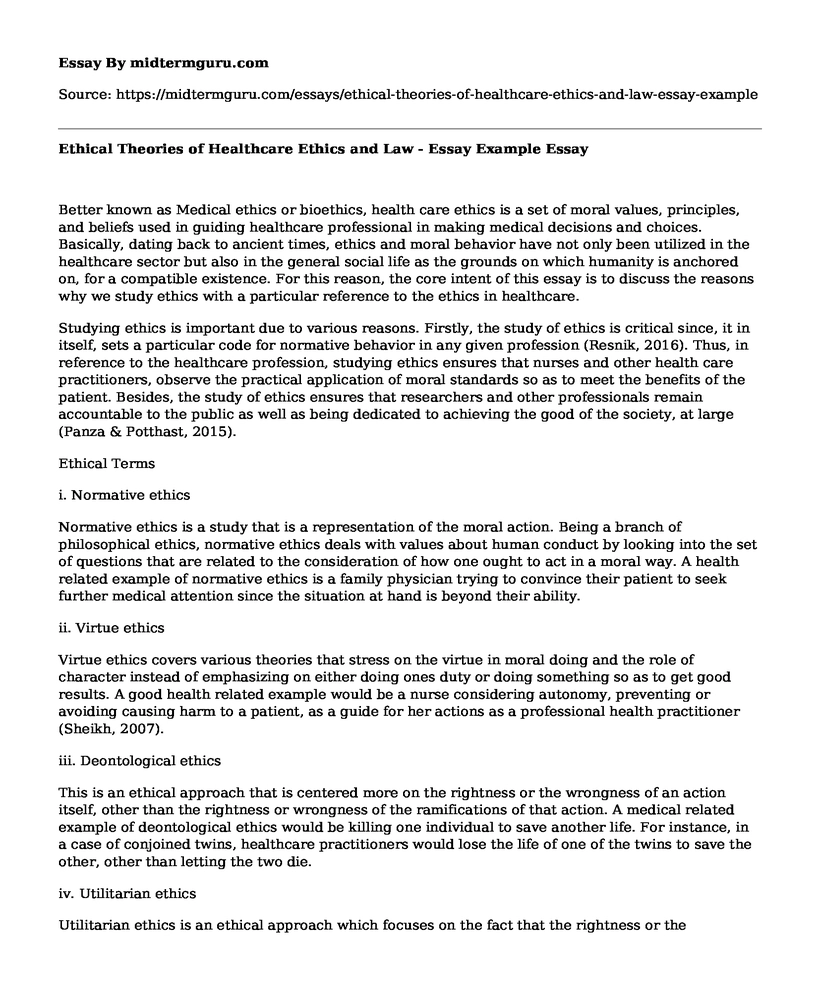Better known as Medical ethics or bioethics, health care ethics is a set of moral values, principles, and beliefs used in guiding healthcare professional in making medical decisions and choices. Basically, dating back to ancient times, ethics and moral behavior have not only been utilized in the healthcare sector but also in the general social life as the grounds on which humanity is anchored on, for a compatible existence. For this reason, the core intent of this essay is to discuss the reasons why we study ethics with a particular reference to the ethics in healthcare.
Studying ethics is important due to various reasons. Firstly, the study of ethics is critical since, it in itself, sets a particular code for normative behavior in any given profession (Resnik, 2016). Thus, in reference to the healthcare profession, studying ethics ensures that nurses and other health care practitioners, observe the practical application of moral standards so as to meet the benefits of the patient. Besides, the study of ethics ensures that researchers and other professionals remain accountable to the public as well as being dedicated to achieving the good of the society, at large (Panza & Potthast, 2015).
Ethical Terms
i. Normative ethics
Normative ethics is a study that is a representation of the moral action. Being a branch of philosophical ethics, normative ethics deals with values about human conduct by looking into the set of questions that are related to the consideration of how one ought to act in a moral way. A health related example of normative ethics is a family physician trying to convince their patient to seek further medical attention since the situation at hand is beyond their ability.
ii. Virtue ethics
Virtue ethics covers various theories that stress on the virtue in moral doing and the role of character instead of emphasizing on either doing ones duty or doing something so as to get good results. A good health related example would be a nurse considering autonomy, preventing or avoiding causing harm to a patient, as a guide for her actions as a professional health practitioner (Sheikh, 2007).
iii. Deontological ethics
This is an ethical approach that is centered more on the rightness or the wrongness of an action itself, other than the rightness or wrongness of the ramifications of that action. A medical related example of deontological ethics would be killing one individual to save another life. For instance, in a case of conjoined twins, healthcare practitioners would lose the life of one of the twins to save the other, other than letting the two die.
iv. Utilitarian ethics
Utilitarian ethics is an ethical approach which focuses on the fact that the rightness or the wrongness of an action should be judged according to its consequences. Therefore, through our actions, we ought to produce the most pleasure and reduce pain and suffering. A healthcare organization related example of utilitarian ethics is a nurse giving pain relievers to a patient who is in so much pain while the patient is not supposed to take any medication at that particular moment.
v. MicroethicsThis is a type of applied ethics that is considered as the everyday ethics of clinical practices (Hanford, 2006). For example, a healthcare practitioner ensures that a patient takes the right medication and that their diagnosis is done in the best way possible.
Example of Ethical Issues
Ethical issues are situations which a choice has to be made between two options which both do not resolve the situation in an ethically permissible way. An example of an ethical issue is the question of whether abortion is moral and whether it should be legalized, citing morality, legal or religious issues.
Examples of Ethical Issues in Healthcare
The healthcare profession is often vulnerable to various ethical issues that can possibly affect the performance of the professionals. Some of the examples of these issues are such as;
i. The issue of withdrawing or withholding a life-sustaining treatment in scenarios where the patient is critically or terminally ill.
ii. The ethical issues relating mental health especially in societies where this condition is perceived with a lot of stigmatization.
In conclusion, like any other ethics, medical or healthcare ethics place a duty on individual healthcare practitioners to comply with the set code of conduct for the overall well-being of the patient. Thus, ethics ensure fairness for all persons, the impact a definite decision has on the society, as well as the decisions future implications.References
Hanford, J. (2006). Ethics & Medicine. An International Journal of Bioethics;Spring, 22(1).
Panza, C., & Potthast, A. (2015). Why Study Ethics? Retrieved from http://www.dummies.com/education/philosophy/why-study-ethics/
Resnik, D. B. (2016, June 30). Bioethics. Retrieved from https://www.niehs.nih.gov/research/resources/bioethics/
Sheikh, S. A. (2007). The Importance of Ethics in Health Care System. JDUHS, 1(1), 46. Retrieved from http://www.duhs.edu.pk/download/issue.pdf
Cite this page
Ethical Theories of Healthcare Ethics and Law - Essay Example. (2021, May 28). Retrieved from https://midtermguru.com/essays/ethical-theories-of-healthcare-ethics-and-law-essay-example
If you are the original author of this essay and no longer wish to have it published on the midtermguru.com website, please click below to request its removal:
- Essay on New Drug for the Treatment of Lewy Body Dementia
- Stop HIV/AIDS Background: Vision and Goals of the Program
- Paper Example on Role of Conflict and Ambiguity
- Paper Example on Criminal Justice: Witness Interference
- Paper Example on Organized Crime and Human Trafficking
- Organizational, Interpersonal, and Group Communication in Hospital - Essay Sample
- Curing Cancer: Scientists Working Hard to Find a Cure - Essay Sample







